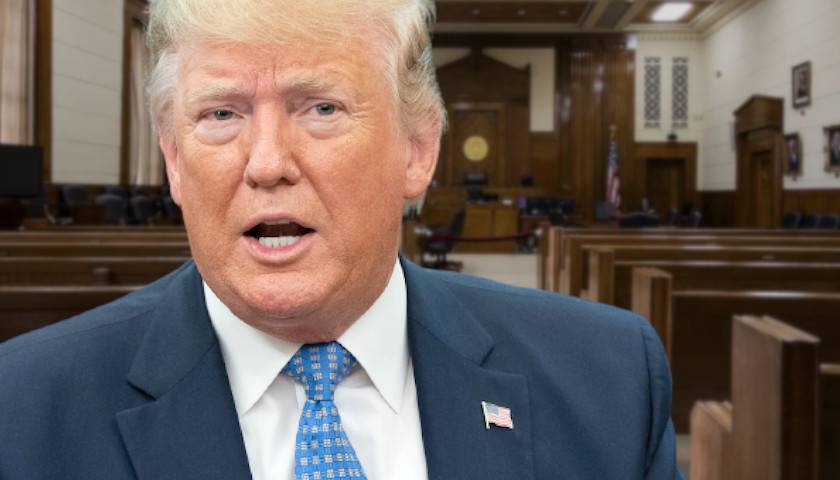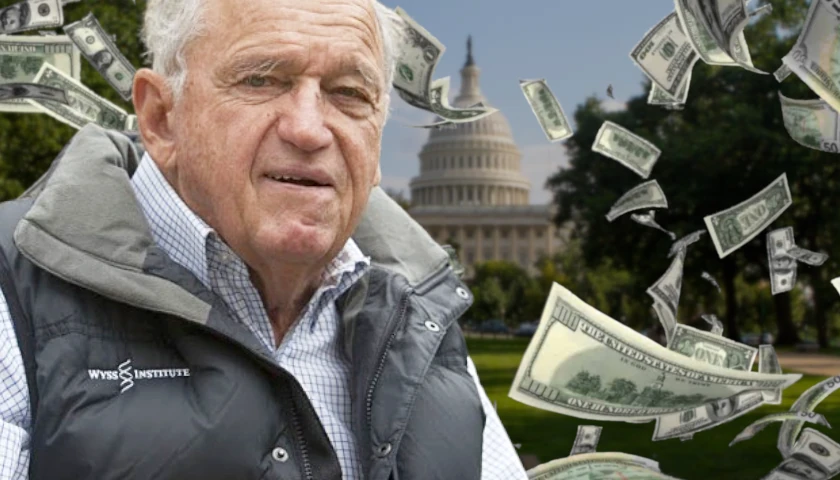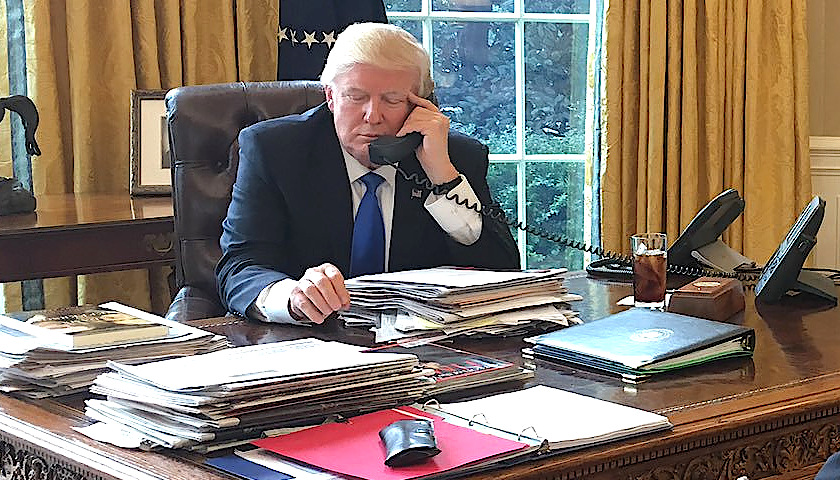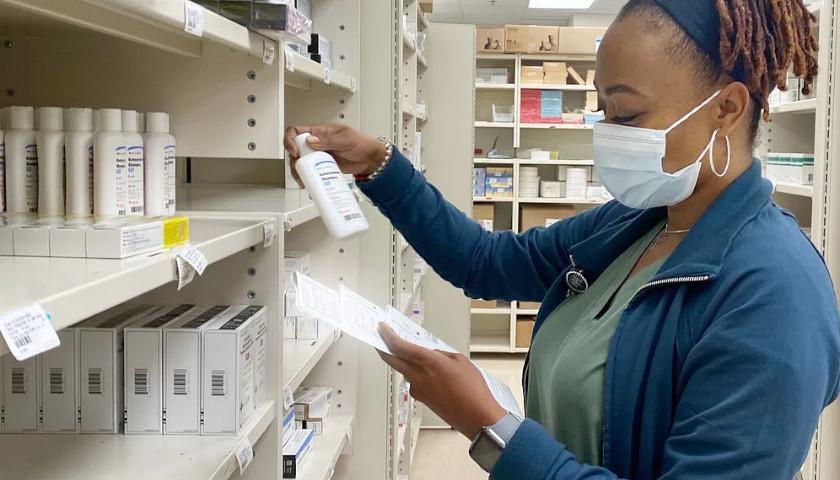For nearly three years, the American people have received media-filtered coverage of court proceedings for January 6 defendants in the nation’s capital.
Pandemic-era rules enabled the public to access hearings by telephone during the early stages of the Department of Justice’s prosecution of Capitol protesters. But as the first jury trials commenced in the spring of 2022, phone-in lines for most D.C. courtrooms were shut down. Now anyone, including reporters, interested in covering the district court in Washington—where jury trials, plea agreements, and sentencing decisions for January 6 defendants take place—must attend in person. Electronic devices are not permitted in the courtroom; media rooms are often full for high-profile cases.
The blackout is, of course, by design. Had Americans witnessed the shameful behavior of federal prosecutors and judges in January 6 proceedings, a revolt would be underway. Imagine the public outcry to this: judges granting the government’s demand to deny release of Donald Trump supporters accused of no serious crime; DOJ lawyers concealing potentially exculpatory evidence including video from defendants; harsh condemnations of Trump supporters’ political views including the belief the 2020 election was stolen; tearful Marxist-era struggle sessions where January 6 defendants beg for mercy by denouncing their one-time support for Trump; the ordering of excessive prison time for activity once considered the exercise of free speech.
How would the country have reacted to watching Judge Timothy Kelly, for example, abruptly end cross examination of an FBI agent involved in dubious behavior such as monitoring the phone calls of an incarcerated January 6 defendants and possibly destroying evidence in the case of the Proud Boys? Or Kelly’s successful efforts to withhold evidence about numerous FBI informants in the group?
Unfortunately, all of the proceedings have occurred in mostly empty courtrooms without video cameras—in turn preventing oversight of government prosecutors and the federal bench.
It appears Attorney General Merrick Garland wants that same degree of opaqueness for Trump’s trial in Washington. The DOJ will fight requests to permit cameras in the E. Barrett Prettyman federal courthouse for Trump’s January 6-related trial, which is set to begin in March.
As both sides prepare to square off just four months from now, major news organizations are asking Judge Tanya S. Chutkan to allow cameras in her courtroom to enable live coverage of the unprecedented event. “Since the founding of our nation, we have never had a criminal case where securing the public’s confidence will be more important than with United States v. Donald Trump,” lawyers representing a coalition of media companies including CNN, the New York Times, and Associated Press wrote in an October 5 application to Chutkan. “The prosecution of a former President, now a presidential candidate, on charges of subverting the electoral process, presents the strongest possible circumstances for continuous public oversight of the justice system.”
In the better-late-than-never category, the coalition argues that a ban on video access to the trial is unconstitutional. And in the pot-calling-kettle-black category, the coalition worries that without cameras, the public will only “see and hear the sound bites from out-of-court interviews and images.” Some interested parties might “spin” or “mischaracterize” what happened in court. Do tell!
Now, it wouldn’t be the national news media if they didn’t come up with outlandish claims in service to the regime and their request did not fail on that score. Trump, the application states, tried to “subvert the will of the people” before and on January 6. Citing the Crime Victims’ Rights act, the coalition further insists Joe Biden voters are “victims” of the former president’s attempts to remain in office and therefore entitled to witness their perpetrator in real-time. “[Only] a minute fraction of the 81.3 million victims of this alleged conspiracy would be able to attend and observe the proceedings for themselves.”
Just think—the most powerful news corporations in the world think Biden voters, not those denied a full vetting of voting fraud in swing states that resulted in a slim defeat for the incumbent president, are victims. These same media outlets, by the way, incessantly peddled the Russia collusion hoax for years to cast doubt over Trump’s 2016 victory and helped the 2020 Biden campaign designate coverage of Hunter’s laptop a foreign disinformation operation.
Where can Trump voters file lawsuits against the Washington Post under the Crime Victims’ Rights act?
The Unlikeliest of Partners
Interestingly, the access controversy is creating strange bedfellows between the media, Team Trump, and some of his sworn enemies in the Democratic Party. Trump’s lead attorney in the D.C. case said during a July interview on Fox News that his client wants “cameras in the courtroom so that all Americans can see what’s happening in our criminal justice system.” The media coalition cites that interview in its pleading to Judge Chutkan.
And several of Trump’s notorious antagonists in Congress asked the committee that oversees the federal judiciary to support cameras in the courtroom for both Trump trials. (The classified documents trial is scheduled to begin in May in Florida.) More than three dozen Democrats, including Representatives Adam Schiff and Bennie Thompson, sent a letter to the Judicial Conference in August seeking to reverse a ban on cameras in federal courtrooms.
Politico reported last week the committee denied their request.
The DOJ has until Friday to reply to the coalition’s application and a separate request on the same issue from NBC News. In an October 18 motion, lawyers representing the DOJ’s civil division notified Chutkan the department would submit “opposition to the applications.”
Why is Garland fighting what should be a no-brainer? After all, he constantly brags about bringing “transparency and accountability” to the DOJ. What are he and Special Counsel Jack Smith trying to hide?
They can’t be concerned about protecting government witnesses—every individual tied to Trump’s alleged “conspiracy” to “overturn” the results of the 2020 election, the basis of Smith’s four-count indictment against the former president, is a public figure. Most testified during televised hearings of the January 6 Select Committee.
They also can’t argue that the public should not see Judge Chutkan in action. Americans should have confidence the Obama-appointed judge with a history of inflammatory, prejudicial statements about Trump and his supporters will apply a fair hand in the groundbreaking trial of a former president and presumptive GOP presidential candidate. Her record so far in this matter raises plenty of doubt, to say the least. She fast-tracked the trial date and recently entered a broad gag order on Trump, his lawyers, and unnamed surrogates; she temporarily put the order on hold as Trump’s lawyers move to appeal.
Further, opinion polls show roughly half the country believes the federal indictments against Trump are politically motivated. Televised trials, occurring at the same time the 2024 general election campaign gets underway, are an opportunity for the DOJ and special counsel to prove their motives are rooted in the “rule of law,” not partisanship.
Why do they object?
– – –
Julie Kelly is an independent journalist covering the weaponization of the U.S. Government against her citizens, Follow Kelly on Twitter / X.




